- Home
- Linwood Barclay
Trust Your Eyes Page 15
Trust Your Eyes Read online
Page 15
“Jesus Christ,” Howard whispers under his breath. “No, that’s not—look, I’ve done some things in my time. Things I had to do. But, Lewis, we don’t kill people.”
Lewis gives a measured nod. “It wouldn’t be us, Howard.”
“What?”
“It wouldn’t be us. It wouldn’t be you, and it wouldn’t be me. It wouldn’t be connected to us.”
Howard’s mouth is very dry. “Then…”
“I’ve already had a preliminary discussion with someone about our situation,” Lewis says calmly. “I know her work, and she can do this for us.”
“Oh, Lewis, Jesus.” Howard takes a deep breath, lets it out slowly. Then, abruptly, he turns and says, “Her?”
Lewis nods.
Howard shakes his head. “I don’t know. I just don’t know.”
“You have to ask yourself how long you want this problem to continue. If you’re prepared to endure it indefinitely, for this woman to keep coming back for more, for her to blab to her friends how she came into this money, to run the risk that she knows something that could be very damaging to Morris, then go ahead and give her the hundred thousand now.”
Howard puts his head in his hands for a few seconds, then sits up straight, stares ahead, and says, “Do what you have to do.”
TWENTY-THREE
“THE vacuum sucked up the edge,” Thomas said as I came into the house, leaving Dad’s laptop on the porch chair. He pointed. The power head appeared to have digested half of a carpet runner that ran between the front door and the kitchen. The machine turned itself off when it jammed.
“Thomas, just pull the carpet back out of it.”
“With my hand?”
“Yes.”
“What if it comes back on and sucks off my fingers?”
“It’s not going to—”
The phone rang.
“Goddamn,” I said. I picked up. “Yeah?”
“Is this Ray Kilbride?” A woman’s voice.
“Yes.”
“Ray, it’s Alice, at Harry Peyton’s office? We were wondering if you had a moment to pop in and sign a few papers related to the processing of your father’s estate.”
“Uh, yeah, sure,” I said, trying to collect my thoughts. “Of course. When does Harry want me to come in?”
“Well, it’s actually pretty quiet here right now. This may not be a convenient time, but if you had a chance—”
“Fine. I’ll be there in a few minutes.”
I hung up. When I turned around, I nearly bumped into Thomas, who’d been standing only a foot away, awaiting instructions, the disabled vacuum behind him.
“What’s going on?” he asked.
“I have to go to the lawyer’s office and sign some papers.”
“I’m going to go back to work,” Thomas said, his eyes darting upward. “I’m way behind.”
“Fine. I’ll sort out the vacuum later. I’ll be back in a bit.”
DRIVING into town, I couldn’t stop thinking about why my father would be scouring the Internet for information on child prostitution. The first two search items I could get my head around. He’d been talking about getting a new phone, one that could connect to the Net and take pictures and do any number of other things. And, based on the snippets I had heard lately from Harry and Len, maybe Dad was depressed. He could well have been diagnosing himself.
But child prostitution?
All the places my mind took me were places I did not want to go.
I tried to think of some logical reasons why Dad would be doing such a search. There had to be some.
Think.
Okay. So maybe he’d seen something on television, some news program, about the sexual exploitation of children. He was so appalled by what he’d seen, he wanted to learn more. And the reason for that would be…? Maybe he wanted to make a donation to a charity that was working to free children around the world from this kind of servitude.
Did that sound like my father? Did he have a history of seeking out organizations to give his money to?
No.
He was a good man. There was no question about that. When people needed help, he was there. I could remember, when I was a child, our neighbors’ house—not the Hitchens, but the people on the other side—catching on fire. The fire department got there before the house was destroyed, but there was considerable damage to the kitchen. They had no insurance, couldn’t afford to hire someone to rebuild, and opted to do the work themselves. The only problem was, while they had the determination, they lacked the skills. And while Dad had never worked as a plumber or carpenter, he was a pretty good do-it-yourselfer, having learned those things from his own father. For a month, whenever he had time, Dad worked on that kitchen.
So Dad liked to help, but in a hands-on kind of way. He’d donate time and energy, but he wasn’t a guy who picked up the phone and divulged his credit card number for some humanitarian organization.
So that nixed that reason for researching child prostitution.
Maybe he’d heard that it was a problem in the upper New York State area, and wanted to make sure it wasn’t becoming a problem in Promise Falls. That seemed even more unlikely.
So what other reason?
The one I couldn’t bring myself to consider was that Dad was interested in the subject.
When I got back to the house, I’d check the history of Web sites Dad’s search had led him to. Maybe those sites, whatever they turned out to be, would shed light on my father’s motivations.
I’d heard stories over the years, people discovering things about their parents after they’d died. A mother who’d had a child she’d given up for adoption before she married. A father who’d been having an affair with his secretary. A mother who’d for years kept hidden her pill addiction. A father who’d led a dual life, with a separate, secret family in another part of the country.
Any one of those discoveries would be shocking, but they’d be nothing compared to learning your father was a pervert.
Which I did not know to be true. Which I simply could not believe.
There was one other possibility.
Dad never looked up child prostitution in the first place.
Someone else had been using Dad’s laptop.
“YOU okay, Ray?” Harry Peyton asked as I pulled my chair close to the edge of his desk to sign a few documents.
“Yeah, sure,” I said.
“You look stressed out.”
I scribbled my signature in the places he was pointing. “I’m fine.”
“You don’t need to be worried about things. All the paperwork’s going through without a hitch.”
“That’s good to hear.”
“How about things at the house? How’s Thomas?”
I put the pen down and leaned back in my chair. “How’s Thomas,” I repeated, looking down. “There’s a question.”
“Ray, what’s on your mind?”
“Harry,” I said, “you’re sort of my lawyer, too, aren’t you?”
“Ray, of course.”
“I mean, I know you were Dad’s lawyer, and you’re handling all this estate stuff, but are you my lawyer, too, about other things?”
“Yes,” he said. “I’m your lawyer. You can talk to me.”
I started to speak, and then didn’t know where to begin. Not with Dad and what I’d found on his laptop. But that discovery was not the only thing that had happened in the last twenty-four hours to leave me shaken.
“The FBI paid us a visit,” I said.
“They what? Jesus Christ, Ray, you should have called me. Did they have a warrant?”
“They just showed me their IDs.”
“Good Lord.”
I told him all of it. How they came in, asked questions of Thomas and me. Finding out Thomas had sent all those e-mails to the CIA, addressed to Bill Clinton. How I’d heard him having an imaginary conversation with the former president.
Harry placed his palms on the table. “Unbelievable. You’ve got
a lot on your plate, Ray.”
“There’s something else I wanted to bounce off you,” I said.
“What?”
“About Dad.”
“Go on.”
“Did Dad ever…did you ever get a sense of what Dad’s private life was like?”
“What do you mean, private life? Are you talking about his sex life?”
“I guess,” I said.
Harry shrugged. “I don’t know. You mean, since your mother passed away?”
Not really, but I said, “Sure.”
“I don’t honestly know. I can’t see him bringing anyone to the house, and Adam never left the home for extended periods of time because of your brother. He sure wouldn’t have gone anywhere overnight. But then again, if he had met someone, he could have gotten together with her during the day, when he didn’t have any qualms about leaving your brother for a few hours.”
“You ever see him with anyone? Did he ever talk about seeing anyone?”
Harry shook his head. “No. But you know, a man his age, there’s every reason to think he’d be, you know, sexually active. Do you mind my asking why this is an issue, Ray? Are you thinking there’s going to be some woman coming out of the woodwork, saying she’s got some sort of claim on the estate?”
“No, no, it’s okay,” I said. “You know what? Forget I even asked. It’s nothing.”
MAYBE that was what I should have done. Forgotten about it. Pretended I never saw those two words on my father’s computer.
But before I let this go, I was going to see what Web pages that search led him to. I didn’t want to know, but I had to know.
When I got home, Thomas was where I expected him to be. Dad’s laptop was sitting on the kitchen table, closed. Thomas must have brought it in from the porch and turned it off.
I opened the lid, hit the button, waited the half minute or so it took for the computer to power up. Then I opened the Web browser.
I went to the search field and typed in a single letter to bring up the previous searches.
There was nothing there.
Nothing about smartphones, depression, or child prostitution.
“What the hell?” I said under my breath.
I moved the cursor up to History and clicked. It was empty. The list of all the Web sites that had been visited with this machine had been erased.
TWENTY-FOUR
MANY nights, even after all these years, she dreams of being on the bars.
It’s 2000. The Sydney Olympics. Nicole is fifteen. Performing her routine on the uneven bars before thousands of spectators, hundreds of cameras, her fellow artistic gymnastics team members, her coach. She feels the chalk on her hands, then leaps for the lower bar, grasping it firmly, feeling the pull on her arms, spinning around it twice before having enough momentum to propel herself to the higher bar, and then she is off, rotating, the stadium, the people, flying past her field of vision, except she’s not seeing them. They’re not out there now. There are no spectators, no cameras, no fellow team members, no coach. There is only Nicole, and these two bars. There is nothing else in the entire universe for the next minute, which seems so much longer than a minute. When she is dreaming, this minute can go on for hours. She is soaring. Flying like a bird. Weightless. There’s nothing like it, no way to describe it. She thinks about how impossible it must be for someone who has walked on the surface of the moon to describe the experience. She is not walking on the moon, but when she is on the bars, the high she feels, can it really be all that different? Olga knows. Nadia knows. There is no way to put it into words. There are the bars, and then there is everything else.
The nights she does not dream about the bars, she dreams about the kills.
They are, in their own way, equally graceful. Swooping in on one’s prey as noiselessly and as swiftly as moving from the upper bar to the lower. No wasted effort. No superfluous moves. In their own way, a thing of beauty.
A perfect execution.
Whether her dreams are of uneven bar routines or assassinations, they are always gold medal performances. Never a silver. Never a bronze. Sometimes, her dreams meld. As she comes off the high bar, doing her final maneuver, preparing for her dismount, her hands now free, she sees in them a dagger. As her body, an instrument in its own right, descends, so, too, does the dagger.
Woe be to anyone who waits below.
She is on Orchard Street.
Nicole has the address. She has been briefed. She has a picture. Tall, with long, dark hair. The target will be there. Allison Fitch. She shares an apartment with a friend, but the friend works days. Allison works in a bar at night, so she sleeps through the day.
Nicole doesn’t know who this Allison Fitch is, or what she has done. She doesn’t know who, exactly, wants this woman dispatched, but given that it is Lewis who has engaged her, she can guess that this woman presents a threat to someone very important. Fitch has something on someone, and it may be in her phone. Nicole has been told to make sure she recovers it.
But none of this really matters to Nicole. It’s a job.
She pulls her black baseball cap down low on her forehead as she crosses Orchard. She feels in her pocket for the plastic bag. It’s a strong one. Even if the woman claws at it with her fingernails, it will not tear. Nicole does not use guns. She does not like guns. She does not like the noise they make. She doesn’t have to do much self-analysis to figure out why. From the moment she started out in track and field, she hated the starter’s pistol. Muscles tensed, breath held, waiting for it to go off. It was those last milliseconds, before the gun exploded, that she’d always hated the most.
She doesn’t like them now, even when they are equipped with a silencer. A gun is heavy, difficult to conceal. And it makes so little use of the body. Anybody can use one. Nicole likes physical involvement. Suffocation involves strength. So does thrusting with an ice pick. But today she will use a simple plastic bag.
No one has ever been arrested for carrying a plastic bag, although she is carrying other devices that would definitely interest the police if they were to stop her for any reason. She stands at the entrance to the building, and before entering glances up and down the street.
Nicole sees no police cars, nothing to worry her. A block away, there is a car, with some odd contraption strapped to its roof, stuck in traffic, but it is of no concern to her.
Nicole steps into the lobby of the building, studies the directory of names and buzzers. She presses several at once, careful not to buzz the one for Allison Fitch. A few seconds later, a voice crackles from the speaker. “Hello?”
But another, less cautious tenant has actually hit the button to buzz someone in. Nicole opens the door and enters the building, then waits for a couple of minutes. She doesn’t want anyone opening their apartment door to see who was hitting the buzzer. They’ll peer out, see no one, then go back inside.
This is a building without elevators. She climbs the two long flights of stairs and is relieved to encounter no one. However, even if she does, she knows that anything anyone might remember about her, other than that she is a white woman in her twenties, will be wrong. The brim of her cap, as well as the sunglasses, shields much of her face. Her hair is black this afternoon, but it will be blond tonight.
She determines, once she is in the hallway, that the apartment overlooking Orchard is the one at the very end of the hall. She approaches the door to apartment 305, but before going to the trouble of picking the lock, she tries turning the doorknob with her gloved hand, in case it is unlocked.
No joy. It’s locked. She reaches into the inside pocket of her windbreaker and finds the tool she carries for just such an occasion. As locks go, this looks like a simple one. If there’s a chain on the inside, that will slow her down for maybe another thirty seconds. She has several rubber bands in her pocket. All you have to do is tie the band to the chain, then loop the end of it over the knob. Then, as you close the door, the chain is pulled from the slot.
Practiced it a mi
llion times. Now, she can do it with her eyes closed.
The door opens.
The chain is not in place.
She opens the door a fraction of an inch and listens. She can see a sliver of kitchen, and beyond that, a small living room. A foldout couch has been left open, the covers askew. Two people share this apartment. If the target is not using the pullout, she must be in the bedroom. Nicole is guessing that room is to the left of the living room.
In one smooth motion, Nicole opens the door, steps in, and closes it behind her, all without sound.
Now that she’s in the apartment, she stands frozen, listening. A window must be open, because the sounds of the street are distinct. That’s a good thing. Although she moves stealthily, a bit of background noise can’t hurt.
Nicole listens for another person. Snoring, soft breathing. A shower running.
A heart beating.
She hears nothing, yet senses a presence. She takes a couple of steps toward the living room, waiting for a glimpse of the door into the bedroom.
She edges past a kitchen table set with two chairs that scream IKEA. A monthly calendar printout, with Allison Fitch’s bar shifts penciled on it, is held to the fridge by a magnet in the shape of a cat.
Jesus, she thinks. Don’t let there be a cat in here. She does not sense one. She doesn’t smell one. There is no bowl on the floor. But the kitchen is in some disarray. The sink is full of dishes. A half-full cup of coffee sits on the table.
Nicole can see the bedroom door, and into the room. It’s a typically small New York apartment bedroom. Eight by ten, maybe. Just enough room for the unmade double bed. A window on the far wall. Raised.
There she is.
Not in the bed, but standing at the window, her back to Nicole. Dark hair hanging to her shoulders. Her hands resting on top of the air-conditioning unit. Looking down at the street. She is dressed. Dark blue skirt, white blouse. The way she’s standing, she’s probably in heels, but Nicole is unable to see below her knee; the bed is in the way.
There’s only twelve feet between them.
She’s measuring the distance in her head. Not enough time to run around the bed. Have to go over it. Start at a run, leap, left foot hits the bed, right foot lands on the other side. She’ll be on her in half a second. Got her Nikes on.

 Chase
Chase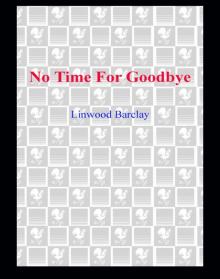 No Time for Goodbye
No Time for Goodbye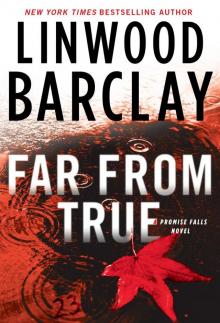 Far From True
Far From True Lone Wolf
Lone Wolf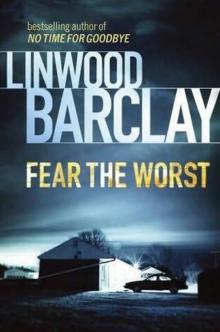 Fear the Worst
Fear the Worst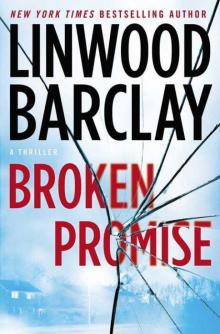 Broken Promise
Broken Promise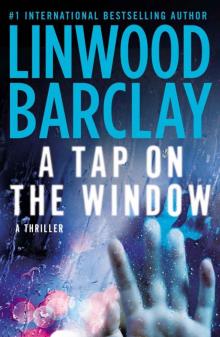 A Tap on the Window
A Tap on the Window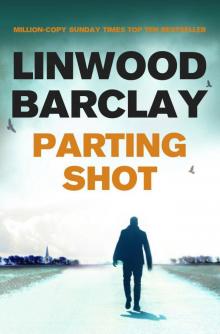 Parting Shot
Parting Shot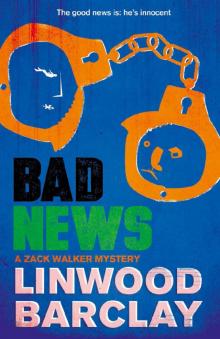 Bad News
Bad News Too Close to Home
Too Close to Home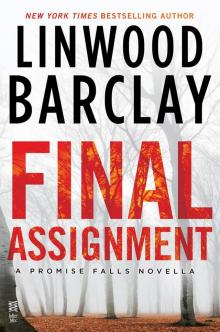 Final Assignment
Final Assignment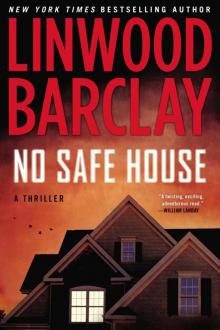 No Safe House
No Safe House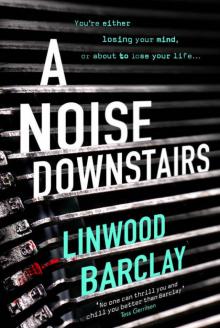 A Noise Downstairs
A Noise Downstairs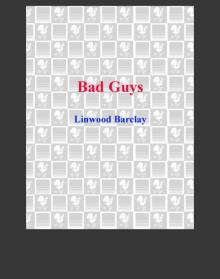 Bad Guys
Bad Guys The Accident
The Accident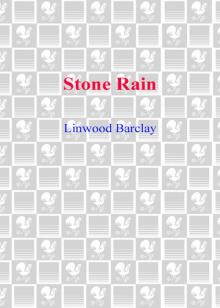 Stone Rain
Stone Rain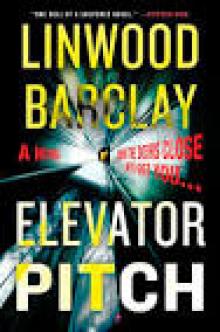 Elevator Pitch
Elevator Pitch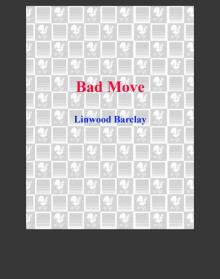 Bad Move
Bad Move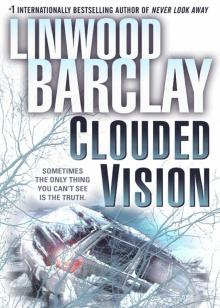 Clouded Vision
Clouded Vision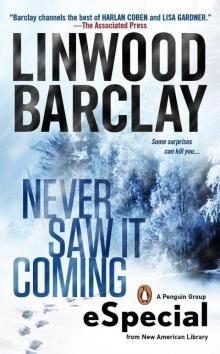 Never Saw It Coming
Never Saw It Coming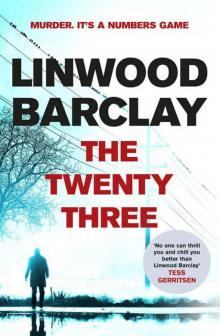 The Twenty-Three
The Twenty-Three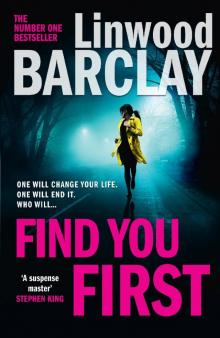 Find You First
Find You First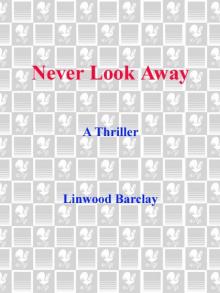 Never Look Away
Never Look Away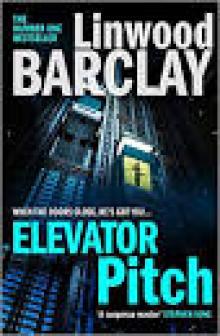 Elevator Pitch (UK)
Elevator Pitch (UK)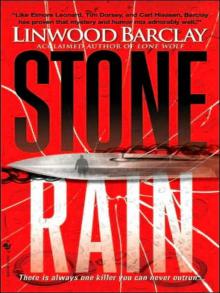 Stone Rain zw-4
Stone Rain zw-4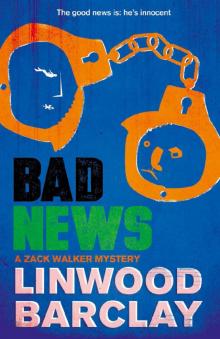 Bad News: A Zack Walker Mystery #4
Bad News: A Zack Walker Mystery #4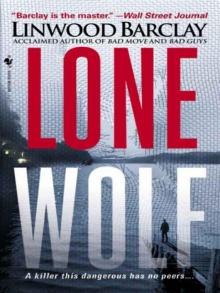 Lone Wolf zw-3
Lone Wolf zw-3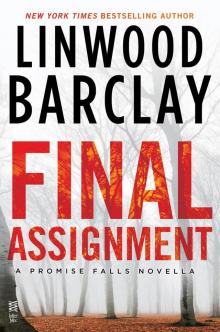 Final Assignment: A Promise Falls Novella
Final Assignment: A Promise Falls Novella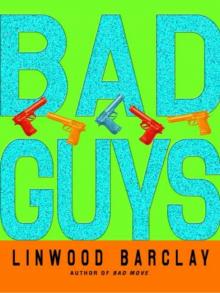 Bad Guys zw-2
Bad Guys zw-2 Never Saw It Coming: (An eSpecial from New American Library)
Never Saw It Coming: (An eSpecial from New American Library)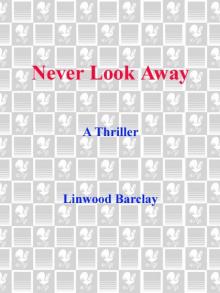 Never Look Away: A Thriller
Never Look Away: A Thriller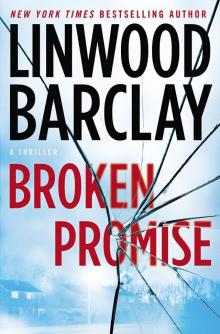 Broken Promise: A Thriller
Broken Promise: A Thriller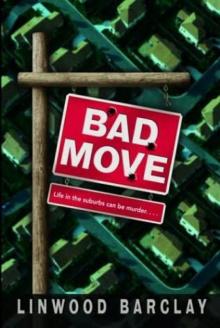 Bad Move zw-1
Bad Move zw-1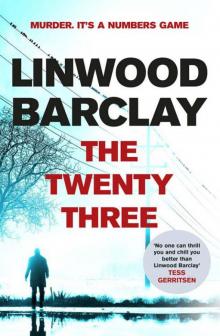 The Twenty-Three 3 (Promise Falls)
The Twenty-Three 3 (Promise Falls)